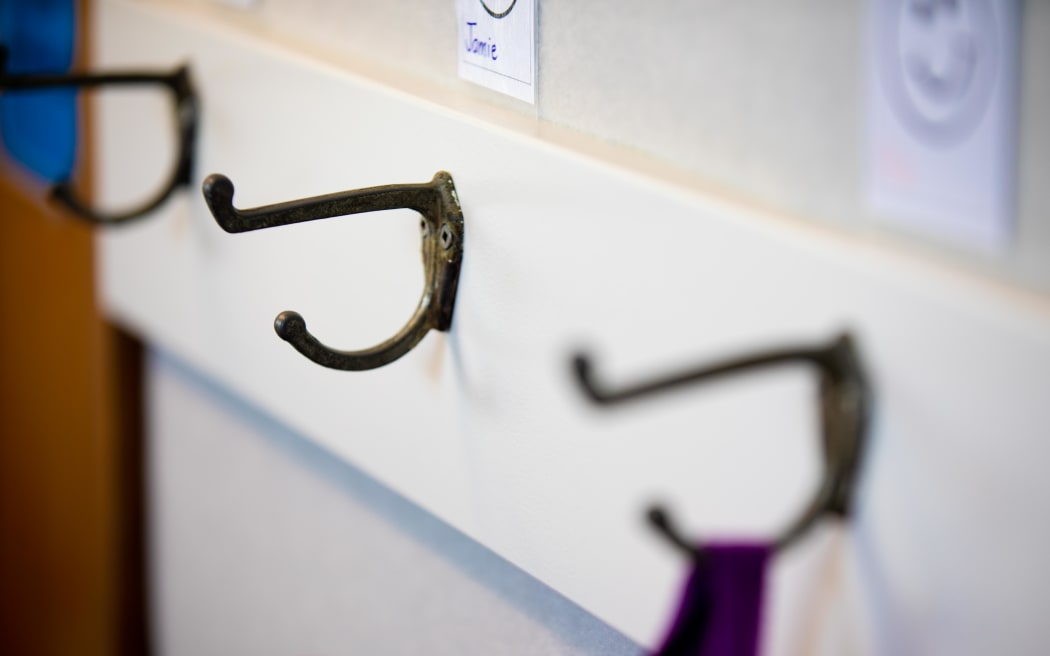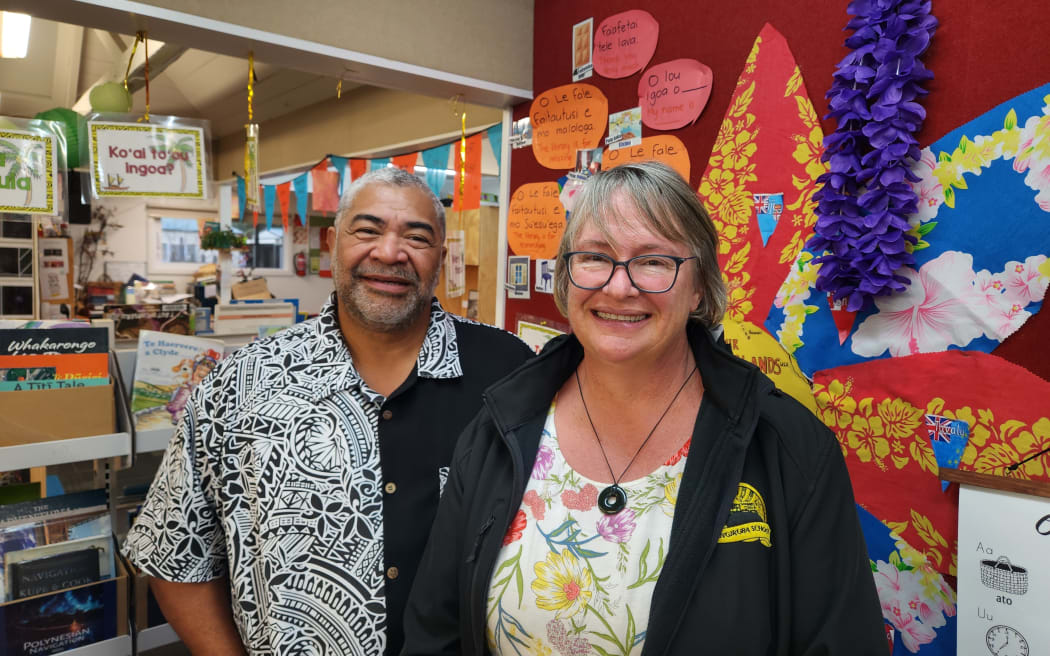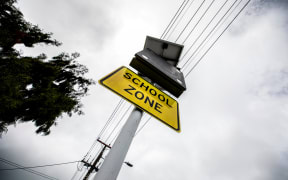
School attendance has been low ever since the pandemic. File photo. Photo: RNZ / Marika Khabazi
The secrets to high attendance include ignoring minor illnesses and enjoying school, students say.
Their comments come after the government announced it would develop an attendance action plan by the end of June, saying attendance was taking too long to rebound to pre-pandemic rates.
The Ministry of Education will release its latest batch of truancy figures on 12 April.
Secondary Principals Association president Vaughan Couillault told RNZ attendance appeared to be improving, including at his own school, Papatoetoe High in south Auckland.
"For me it does appear better. We've had fewer disruptions in term one. The weather's been a little better, less rain, all of those things contribute to people getting here and there has been a bit of a national conversation about it," he said.
Most students were present each day, but the number reaching the threshold for regular attendance, being at school for more than 90 percent of the time, could be better.
"If you look at my place, my daily attendance is solidly in the mid to late 80s every day. That's the population of my school that are here everyday.
"But when you look at the regular attendance where you've got to be here 90 percent of the time to be considered regular attending, then it doesn't look quite so good."
Two Year 13 students from Porirua's Aotea College, Abigail and Blessing, said their attendance rates of 100 percent this year and high-90s last year were largely due to ignoring the occasional illness.
"I was a bit sick a couple of weeks ago. If it's not Covid, it's not too bad, I still try to come to school and just push through," Abigail said.
"I try not to sit too close to people and if I really am looking terrible I won't come to school of course."
"If it's just a cough or runny nose you've got to push through to school... There was one day where I thought I should have stayed home, but I didn't," Blessing said.

Associate Education Minister David Seymour has said students who miss school due to sickness will be targeted under the government's action plan. Photo: RNZ / Samuel Rillstone
Both girls said they did not want to miss a class because they were worried about falling behind in their school work.
The school's deputy principal Jamie O'Connor said many students were attending regularly and family attitudes to illness were definitely a factor.
"When Covid came in and there were lot of adverts around about looking after people and if you've got a bit of a sniffle then stay home, and it has taken a little while for families to change their thinking around that sort of thing," he said.
O'Connor said the school's regular attendance rates were rising, though they were not yet at its target of 70 percent.
He said a strong relationship between student, school and family were important and the school regularly told families how their children's attendance was tracking.
Providing a lot of school-based activities also helped to improve attendance.
"Kids that are very connected to school want to be here," he said.
"We spend a lot of time encouraging kids to join sports clubs, join cultural groups, play chess at lunch time. All of those things help foster a connection to the school."
O'Connor said the school was working with some of its worst truants, but it did not forgot those with middling attendance.
"You can get really attracted to the lowest attendees in terms of trying to fix those attendance rates but we've worked quite hard on that 75-90 percent category to try and get those guys back up as well," he said.
On the right track

Eddie Uluilelata and Ondine Souter. Photo: John Gerritsen
At Rangikura School in Porirua, principal Eddie Uluilelata and special education needs coordinator Ondine Souter said the year's attendance data was looking good.
Back in 2022, just 35 percent of the school's children attended school regularly. That increased to 46 percent last year, while this year, it was running at 59 percent so far.
Over the same period, the number of chronic non-attenders had fallen.
They said that this year's figures covered only the first school term, which generally had higher attendance than term two when illnesses hit, driving attendance rates down.
But they were also confident attendance was improving and said there were a lot of factors behind the change.
First and foremost was a whole-school focus on reinforcing the message that regular attendance was important and school was fun, they said.
There were "Toast Mondays" at the school breakfast club, extra-curricular activities, free school lunches, and a competition between year groups for the best attendance, with results shared at assembly and an end-of-year trip for the group that came out on top.
Uluilelata said pupils from Year 6 were "cleaning up" in the competition.
A group of Year 8 pupils later told RNZ the competition was definitely a motivator and they felt guilty if they needed to miss a day due to illness.
Another factor was the reform of the attendance service, which saw local schools create the North Porirua Attendance Service, run from Rangikura School.

Principal Eddie Uluilelata with a group of Rangikura School pupils. Photo: RNZ / John Gerritsen
Souter, who is also the coordinator for the attendance service, said it had two staff with two main roles - working with schools to find ways to improve moderate and irregular attendance, and knocking on doors to help families with the more serious truancy problems.
She said government funding for that work was essential.
"It's absolutely critical to helping families."
She said counsellors and social workers in schools were also a big help.
"We've got Awhi Mai Awhi Atu counsellors in schools, and we have SWIS (Social Workers in Schools) social workers supporting a lot of our children with mental health needs or anxiety. It can be addressed at school in a timely fashion, not having to be referred to health and referring and waiting and that type of thing.
"All those programmes have definitely helped attendance. We've got children in that chronic band that have moved into the 'irregular' band because of direct help from Awhi Mai Awhi Atu. So these extra programmes are really important for us."
Souter said schools could not deal with everything.
"Schools are actioning stuff and trying their best in there, but a lot of the issues are beyond school control and they're the things that we're finding hard," Souter said, noting housing and transport costs as particular problems.
Uluilelata said illness and tangi were the main reasons for justified absences and across the Kāhui Ako (community of learning), holidays during school time were the biggest reason for unjustified absence.
Souter said the school reminded families that missing school was bad for their children's education but it was tough when airfares were cheaper during term time.
Uluilelata and Souter both said Covid-19 had a huge negative effect on school attendance.
"The Covid hangover, we're just coming out of that now," Uluilelata said.
"The mental wellbeing of our whānau came to the fore during the Covid time and thereafter and that's reflected in our statistics. So trying to support them with that, to encourage them that we need to have our students come back to school.
"Covid was two to three years ago, we're still having to work around issues that came about."
Souter said she was not aware of 'school refusal' - children simply refusing to come to school - five or six years ago, but since the pandemic it had become a common problem.
"It's across the board. Across our Kāhui Ako, it's nationwide."
Souter said anxiety might prompt school refusal in some children, but there were multiple reasons.
"There can be things like there's not food at home, there could have been some violence happen at home and that makes it tough to come to school if the night's been disrupted. Gaming at night can be a thing."







